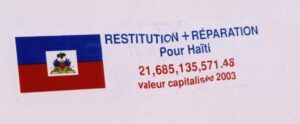
Responsibility for the spoof Bastille Day announcement promising the repayment of Haiti’s ‘independence debt’ to France (covered in an earlier post) was claimed by a group called CRIME.
The original website at diplomatie.gov.fr was taken down by the authorities, but was quickly replaced by one at diplomatiegov.info and the video of the announcement can now be viewed here.
On 16 July, a message from the @DiplomatieFR twitter account stated:
« Le Comité pour le Remboursement Immédiat des Montants Envolés » d’Haïti (CRIME) takes credit for a hoax carried out on July 14.
The acronym works in English too, standing for the Committee for the Reimbursement of the Indemnity Money Extorted from Haiti.
At a press conference in Montreal on 22 July the group promised more action according to this report in the Winnipeg Free Press. And then the issue seemed to disappear from the news.
But on 16 August an open letter to Nicolas Sarkozy was published in the French daily Liberation urging France ‘to pay Haiti, the world’s first black republic, the restitution it is due.’
The letter was reprinted on CRIME’s own website, both in Frenchand English with a full list of signatories. The issue was also covered by BBC News, the Guardian, and the Toronto Star.
That the signatories included French scholars such as Alain Badiou, Etienne Balibar and Jacques Rancière may have brought some comfort to Tontongi, the author of La France doit restituer à Haïti la rançon de l’indemnité (which seems to have been written before the letter was published), who noted the disappointing response of formerly progressive intellectuals such as Régis Debray and René Depestre to Aristide’s renewal of the claim for restitution in 2003.
The substantial article draws on the detailed arguments made by Anthony D Phillips regarding Haiti’s Independence Debt and Prospects for Restitution (pdf) which demonstrate the solid legal case behind Aristide’s claim. In 1825 President Boyer ‘agreed’ to pay a 150 million franc indemnity to compensate French planters for the loss of land and slaves as a result of Haiti’s independence.
The legality of this agreement could be challenged on several grounds: the fact that negotiations were shadowed by the threat of French military force; the dubious basis on which the amount of the indemnity was arrived at; and the already-established consensus among the colonial powers that slavery and the slave trade were morally wrong – as evidenced by the abolition of the slave trade by Britain and the United States in 1807, the commitment to extend abolition in the Treaties of Paris that ended the Napoleonic Wars; and even the (albeit short-lived) abolition of slavery by the French government itself in 1794.
Furthermore, when it became clear that Haiti could not make the scheduled repayments (it had to borrow the first two installments from French banks), in 1834 the government appointed a commission to review the arrangement. Although the Dalloz Report declared the original ordinance unlawful and argued that it was the responsibility of the French government to compensate the planters, a replacement treaty imposed a schedule that was scarcely less crippling.
Phillips examines the legal grounds for restitution in the light of successful ‘unjust enrichment’ claims made by Holocaust victims against Swiss banks, and by American states against tobacco corporations. He concludes:
In the recent movement toward addressing historical injustice through legal and political action, Haiti’s Independence Debt makes a compelling case. The historical background presents a sympathetic story of profound tragedy and unfairness. The story well fits the traditional elements of a cognizable unjust enrichment claim and presents strong arguments against dismissal on procedural grounds. As part of a concerted, multi-disciplinary approach, a claim for the Independence Debt could realize some relief for the modern-day people of impoverished Haiti and perhaps deliver justice for one of history’s most tragic wrongs.
The Christian Science Monitor reprted on 17 August that the French Foreign Ministry had dismissed the petition. But the article makes the following interesting observation:
French officials did not address the legitimacy of the debt, with analysts saying such an admission could open a flood-gate of former colonial claims. France, for its part, has steadily requested that Moscow recompense a group of French investors that prior to 1917 put vast sums into the Russian rail system. Lenin declared the debt void under Soviet rule. But recently Russian prime minister Vladimir Putin agreed to reopen negotiations.
According to a post on The dangers of sovereign debt default, the Soviet government settled with British holders of these so-called Czar Bonds in 1986 ‘because the Soviets wanted to get hold of large amounts of Czarist money frozen in 1917 that was still sitting in British banks.’ And while the Yeltsin government compensated French bondholders to the tune of $400 million in 1996, many have argued that the amount should have been much larger. And the Association Fédérative Internationale des Porteurs d’Emprunts Russes (AFIPER) continue to press for what they argue is full restitution of the bondholders’ investments. (See also this article in Le Figaro in July this year).
If the holders of Czar Bonds are as much victims of violent breaches of international law and custom as the Haitian government, then there is an embarrassing inconsistency in the French government’s response to their claims for restitution. But even if the Haitian petition that the government ignores is based on arguments as strong, if not stronger, than those that led to Russian compensation in 1996, what makes such claims compelling is not the logic of their arguments but the relative standing of the two parties in the dispute. In some circumstances, France can compel Russia to bow to international pressure in ways that Haiti could never duplicate in her dealings with France.
But this is not something we are likely to hear the Foreign Ministry say in so many words.